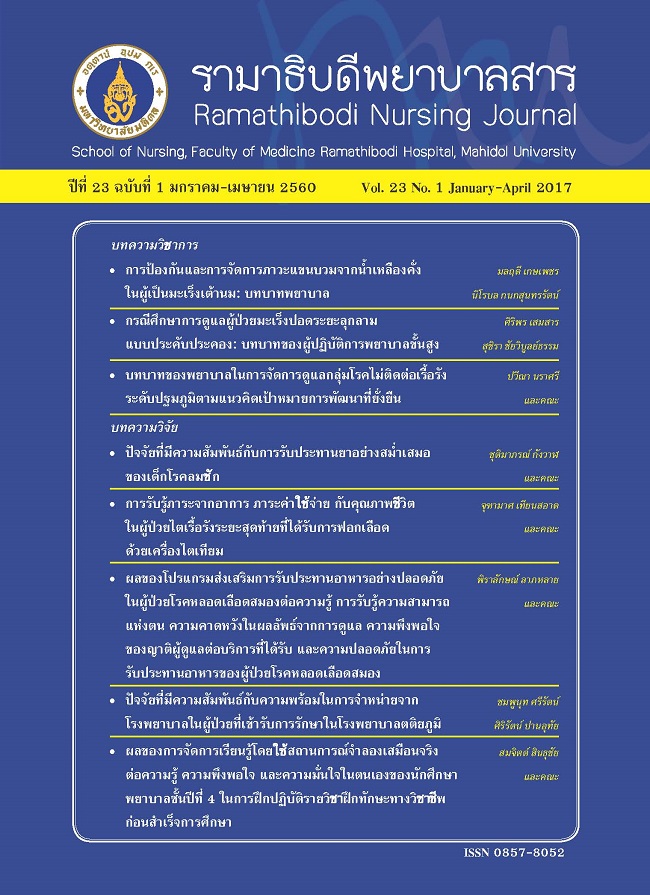Factors Related to Medication Adherence among Children with Epilepsy
Main Article Content
Abstract
บทคัดย่อ
การศึกษาในครั้งนี้มีวัตถุประสงค์เพื่อ ศึกษาการรับประทานยากันชักอย่างสม่ำเสมอ และปัจจัยที่มีความสัมพันธ์กับการรับประทานยากันชักอย่างสม่ำเสมอของเด็กโรคลมชัก กลุ่มตัวอย่างเป็นเด็กและผู้ดูแลเด็กโรคลมชักจำนวน 109 คู่ คัดเลือกกลุ่มตัวอย่างแบบเฉพาะเจาะจงตามเกณฑ์ที่กำหนด เก็บรวบรวมข้อมูลโดยใช้แบบสอบถามข้อมูลทั่วไปของเด็กและผู้ดูแล แบบประเมินความสม่ำเสมอในการรับประทานยา แบบสอบถามความพอใจในการใช้ยาบำบัดโรค และแบบสอบถามความรู้โรคลมชักของผู้ดูแลเด็กโรคลมชัก ผลการศึกษาพบว่า เด็กโรคลมชัก ร้อยละ 92.7 มีการรับประทานยาอย่างสม่ำเสมอ ความรู้เกี่ยวกับโรคลมชักของผู้ดูแล ชนิดของการรักษาด้วยยา และความถี่ในการรับประทานยาต่อวัน มีความสัมพันธ์ทางบวกกับการรับประทานยาอย่างสม่ำเสมอในเด็กโรคลมชักอย่างมีนัยสำคัญทางสถิติ ส่วนระยะเวลาในการเจ็บป่วย ความพึงพอใจในการใช้ยาของผู้ดูแล ไม่มีความสัมพันธ์กับการรับประทานยาอย่างสม่ำเสมอในเด็กโรคลมชัก ข้อเสนอแนะจากการวิจัยคือ ควรมีการประเมินและส่งเสริมให้ผู้ดูแลมีความรู้เกี่ยวกับโรคลมชัก และควรหาวิธีส่งเสริมการรับประทานยาอย่างสม่ำเสมอในเด็กที่ได้รับการรักษาด้วยยากันชักเพียงชนิดเดียว หรือเด็กที่มีความถี่ในการรับประทานยาต่อวันน้อย
ABSTRACT
The objectives of this study were to explore medication adherence among children with epilepsy and to examine factors related to medication adherence among children with epilepsy. The samples consisted of 109 children with epilepsy and 109 caregivers of children with epilepsy. The participants were selected by purposive sampling. Data were collected by the following questionnaires: Questionnaire on demographic characteristics of children and caregivers, The visual analog scale to assess medication adherence, Treatment satisfaction questionnaire for medication, and Caregivers of children with epilepsy knowledge questionnaire. The findings of the study revealed that 92.7% of the children with epilepsy had good medication adherence. The caregivers’ knowledge of epilepsy, medication regimen, and frequency of medication taken were positive related to medication adherence among children with epilepsy with a statistical significance. However, duration of illness and treatment satisfaction were not significantly related to medication adherence among children with epilepsy. The findings of this study recommends that caregivers’ knowledge of epilepsy should be assessed and enhanced, as well as seeking how to promote medication adherence among children who had been treated with monotherapy, or those who had a low frequency of medication taken.
Article Details
บทความ ข้อมูล เนื้อหา รูปภาพ ฯลฯ ที่ได้รับการตีพิมพ์ในรามาธิบดีพยาบาลสาร ถือเป็นลิขสิทธิ์ของวารสาร หากบุคคลหรือหน่วยงานใดต้องการนำทั้งหมดหรือส่วนหนึ่งส่วนใดไปเผยแพร่หรือเพื่อกระทำการใด ใด จะต้องได้รับอนุญาตเป็นลายลักษณ์อักษรจากรามาธิบดีพยาบาลสารก่อนเท่านั้น


